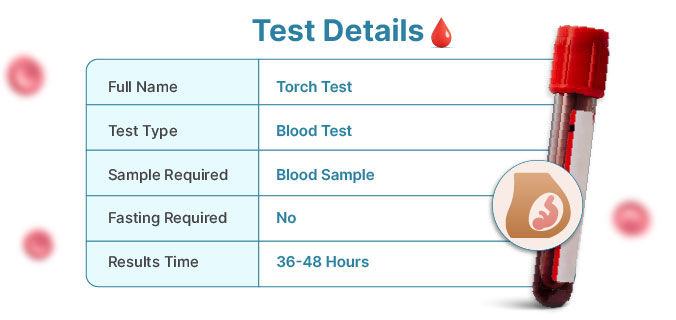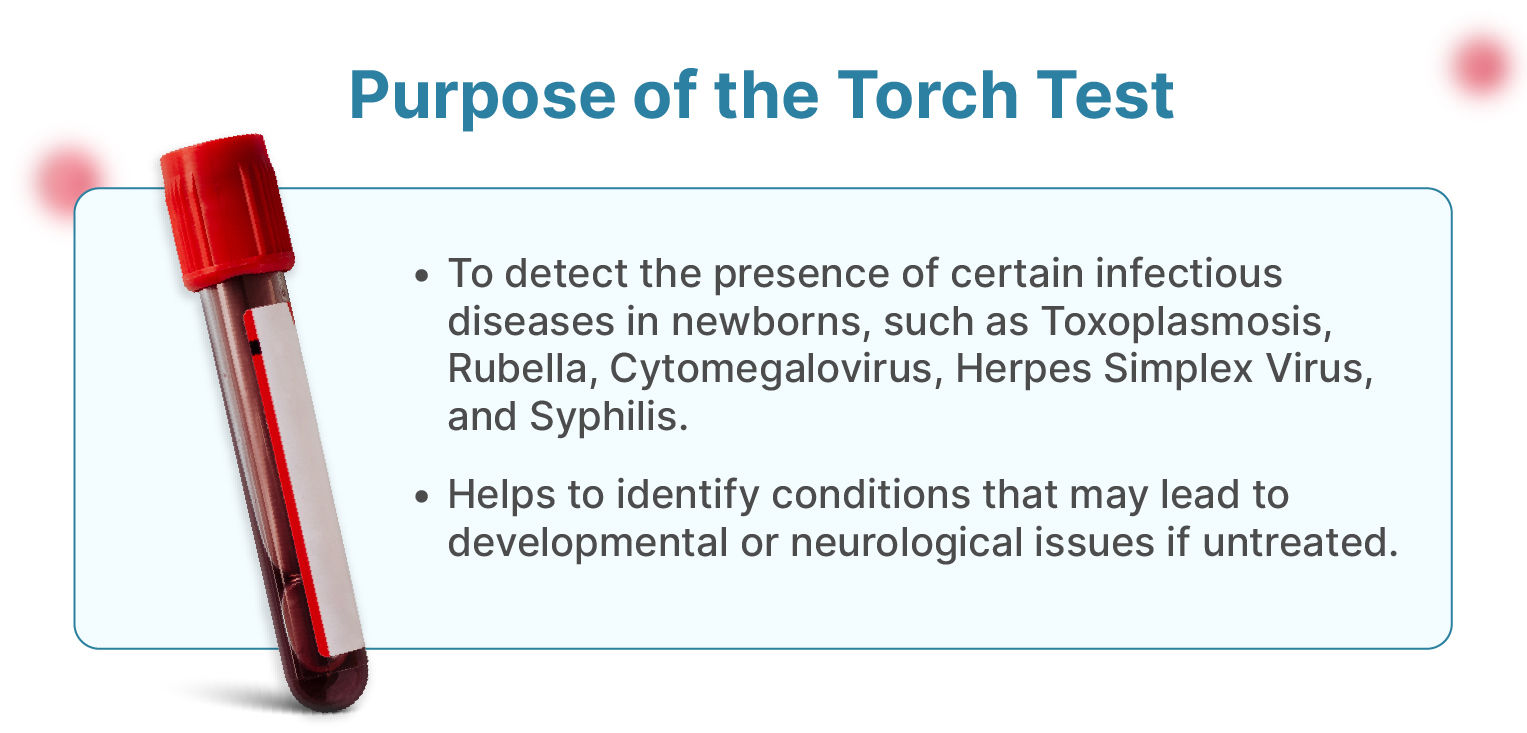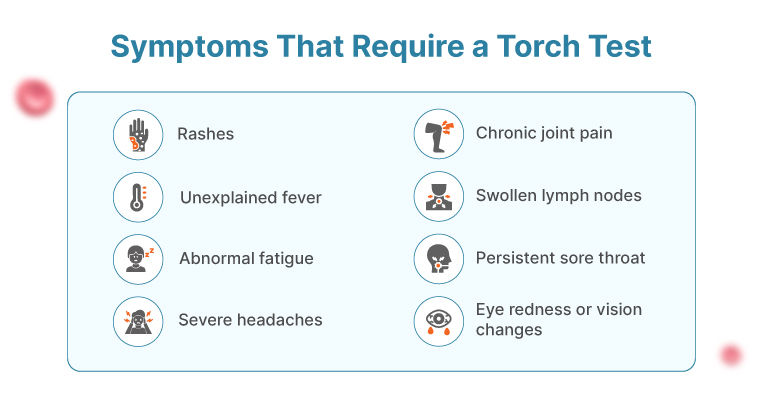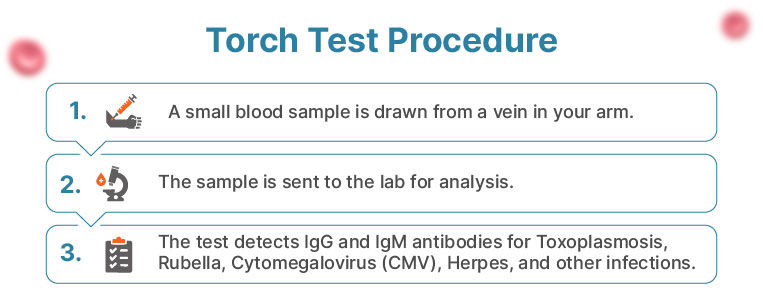Torch Test
No preparation required
 Test(s) Included (10)
Test(s) Included (10)
- Torch Test
10 tests included
About

BLOOD

Both

7 years & above
TORCH 10 IgG & IgM
Test Overview
| Sample Type | Blood |
| Reports Delivery | Earliest reports available within 36 hours |
| Price/Cost | 3500 |
| Number of Tests Included | 10 |
 What is a TORCH 10 IgG & IgM Test?
What is a TORCH 10 IgG & IgM Test?
The TORCH 10 IgG & IgM test is a comprehensive blood test that screens for ten specific infections which can cause serious health complications, particularly in pregnant women and newborns. The term "TORCH" is an acronym representing Toxoplasmosis, Other agents (including Syphilis, Varicella-Zoster, and Parvovirus B19), Rubella, Cytomegalovirus (CMV), and Herpes simplex virus (HSV). This test includes both Immunoglobulin G (IgG) and Immunoglobulin M (IgM) antibodies, providing information about both past and recent infections.
IgG antibodies indicate past infections or immunity, whereas IgM antibodies suggest recent or acute infections. The TORCH 10 IgG & IgM test extends beyond the basic TORCH test by including additional pathogens, making it a TORCH profile test. This enhanced panel helps in detecting a broader range of infectious agents, offering a more comprehensive assessment.
The test is crucial for identifying infections that might not show clear symptoms but can lead to congenital disabilities, miscarriages, or other severe complications if transmitted from mother to child during pregnancy. Early detection through the TORCH test allows for timely intervention and appropriate treatment to prevent adverse outcomes.
What is the TORCH 10 IgG & IgM Test Price?
TORCH 10 IgG & IgM Test Price in Different Cities
| City | TORCH 10 IgG & IgM Test Price |
| Bangalore | ₹4526 |
| Hyderabad | ₹4526 |
| Chennai | ₹4526 |
| Gurgaon | ₹4009 |
| Delhi | ₹4009 |
The TORCH test price can vary widely depending on several factors. Understanding these factors can help patients make informed decisions and manage their healthcare costs effectively. Some of these factors are:
- City: Major metropolitan areas often have higher costs due to the higher overheads of running a laboratory. For instance, the TORCH test price in cities like Delhi, Mumbai and Bangalore may be higher than in smaller towns or rural areas.
- Range: The TORCH panel test cost typically depends on its comprehensiveness and the laboratory's pricing policies. Basic TORCH tests might be less expensive, while the extended TORCH 10 panel can be on the higher end.
- Laboratory Standards: Labs with advanced technology, better infrastructure, and higher accreditation standards may charge more. These labs ensure higher accuracy and reliability, justifying the higher price.
- Home Collection Services: Convenience comes at a cost. Laboratories offering home collection services often charge extra for the service. This can be particularly beneficial for expectant mothers who might find it challenging to visit a lab.
- Insurance Coverage: Insurance coverage can also influence the out-of-pocket cost for the patient. Some insurance plans cover the TORCH test, partially or fully, depending on the medical necessity and the patient's coverage plan. It's advisable to check with the insurance provider beforehand to understand the extent of coverage.
Apollo 24|7 maintains a competitive TORCH test price while delivering exceptional service quality. Before proceeding with a TORCH test, you should check the test price across cities.
What is the Purpose of TORCH 10 IgG & IgM Test?

The primary purpose of the TORCH 10 IgG & IgM test is to screen for a group of infections that can cause significant health issues, especially in pregnant women and newborns. These infections, if not detected and managed early, can lead to severe complications such as congenital disabilities, developmental delays, and other long-term health problems.
The TORCH test purpose is to identify the presence of Immunoglobulin G (IgG) and Immunoglobulin M (IgM) antibodies against various infections. TORCH IgM test is specifically important for diagnosing recent infections, while the TORCH IgG IgM test provides a comprehensive overview of both past immunity and current infection status.
This distinction is crucial in pregnant women, as a recent infection can pose immediate risks to the fetus, necessitating prompt medical intervention. This information helps doctors make informed decisions about necessary treatments, monitoring, and preventive measures to protect both the mother and the developing fetus.
Doctors primarily recommend TORCH test in pregnancy to detect the following conditions:
- The infection can lead to miscarriage, stillbirth, or severe neurological damage in the fetus.
- Syphilis, Varicella-Zoster (chickenpox and shingles), and Parvovirus B19 can result in miscarriage, fetal anaemia, or birth defects.
- Rubella infection during pregnancy can cause congenital rubella syndrome, leading to heart defects, hearing impairment, and developmental delays.
- Cytomegalovirus (CMV) is a common virus that can cause severe birth defects, including hearing loss, vision impairment, and intellectual disabilities.
- Herpes Simplex Virus (HSV) can be transmitted to the baby during delivery, causing neonatal herpes, which can be fatal or lead to long-term neurological issues.
Who Should Get a TORCH 10 IgG & IgM Test Done?

The TORCH 10 IgG & IgM test is particularly recommended for certain individuals, especially those who are pregnant or planning to conceive. Understanding who should undergo this test can help prevent serious complications associated with the infections it screens for.
- Pregnant Women: The primary group for whom the TORCH test is crucial is pregnant women. Pregnancy involves significant physiological changes that can make women more susceptible to infections. If these infections are transmitted to the fetus, they can cause congenital disabilities, developmental delays, or even fetal death. Early detection and management of these infections are vital to ensure a healthy pregnancy and baby.
- Women Planning to Conceive: Women who are planning to become pregnant should also consider the TORCH 10 test. Knowing their infection status beforehand allows them to take preventive measures or receive treatment to minimise risks during pregnancy. Preconception testing can significantly reduce the chances of transmitting infections to the baby.
- Individuals with Symptoms of Infections: Anyone showing signs or symptoms of the infections included in the TORCH panel should undergo this test. Symptoms may include fever, rash, swollen lymph nodes, fatigue, or flu-like symptoms. Identifying the cause of these symptoms through the TORCH test can lead to appropriate treatment and prevent further complications.
- Newborns with Symptoms of Congenital Infections: Infants displaying symptoms like jaundice, low birth weight, hearing loss, or developmental delays should be tested. Early diagnosis can facilitate timely interventions to manage or mitigate the effects of these infections.
- Healthcare Workers and Caregivers: Individuals who work in healthcare settings or care for pregnant women or infants should consider regular testing. This is to ensure they are not carriers of any infections that could be transmitted to vulnerable populations.
- Immunocompromised Individuals: People with weakened immune systems, such as those undergoing chemotherapy or with chronic illnesses, should get tested. Their reduced ability to fight infections makes early detection and treatment essential.
Doing a TORCH test in pregnancy is critical for detecting infections that can have severe consequences for both the mother and the child. Early identification and treatment of these infections can lead to better health outcomes and prevent serious complications.
Components of a TORCH 10 IgG & IgM Test
The TORCH 10 test is a comprehensive diagnostic panel designed to screen for infections that can be transmitted from mother to fetus, potentially causing congenital anomalies or other serious health issues in newborns. The test specifically detects IgG and IgM antibodies indicating past exposure or current infection. This test is crucial in prenatal care to prevent and manage infections that might affect fetal development.
- Toxoplasma IgG Antibodies: Toxoplasma IgG antibodies are indicative of past infection with the parasite Toxoplasma gondii. These antibodies typically appear several weeks after the initial infection and can persist for life, providing immunity against re-infection. The presence of IgG antibodies suggests that the individual has been previously exposed to the parasite and has developed immunity.
- Toxoplasma IgM Antibodies: Toxoplasma IgM antibodies are indicative of a recent or ongoing infection. They appear shortly after the infection and are detectable for several months. The presence of IgM antibodies in a pregnant woman is concerning as it suggests a recent infection, which poses a risk of transmission to the fetus, potentially leading to severe congenital defects.
- Rubella IgG Antibodies: Rubella IgG antibodies indicate immunity to the rubella virus, either from past infection or vaccination. These antibodies provide long-term protection. The presence of IgG antibodies is important for women of childbearing age as it confirms immunity and reduces the risk of congenital rubella syndrome (CRS) in the fetus, which can cause serious birth defects.
- Rubella IgM Antibodies: Rubella IgM antibodies are a marker of recent rubella virus infection. Detection of IgM antibodies suggests an active infection, which is particularly dangerous during pregnancy as it can lead to CRS, characterized by heart defects, developmental delays, and hearing loss.
- Cytomegalovirus (CMV) IgG: Cytomegalovirus (CMV) IgG antibodies indicate past infection with CMV, a common virus that can cause significant health problems in newborns if transmitted during pregnancy. The presence of IgG antibodies shows previous exposure and helps assess the risk of reactivation or reinfection during pregnancy.
- Cytomegalovirus (CMV) IgM: Cytomegalovirus (CMV) IgM antibodies signify recent CMV infection. An active CMV infection during pregnancy can lead to congenital CMV infection in the fetus, resulting in hearing loss, vision problems, and developmental disabilities.
- Herpes Simplex Virus (HSV) Type 1 IgG Antibodies: HSV Type 1 IgG antibodies indicate past infection with HSV-1, typically responsible for oral herpes. The presence of these antibodies shows prior exposure and helps assess the risk of reactivation, especially important during pregnancy to prevent neonatal herpes.
- Herpes Simplex Virus (HSV) Type 1 IgM Antibodies: HSV Type 1 IgM antibodies suggest a recent or active HSV-1 infection. Active infection poses a risk of transmission during childbirth, leading to neonatal herpes, which can be severe and life-threatening.
- Herpes Simplex Virus (HSV) Type 2 IgG Antibodies: HSV Type 2 IgG antibodies are indicative of past infection with HSV-2, the virus commonly causing genital herpes. These antibodies demonstrate previous exposure and provide information on potential reactivation risks during pregnancy.
- Herpes Simplex Virus (HSV) Type 2 IgM Antibodies: HSV Type 2 IgM antibodies indicate a recent or active HSV-2 infection. An active HSV-2 infection near delivery time is a significant concern due to the high risk of neonatal herpes, necessitating careful management to prevent transmission during childbirth.
Understanding TORCH 10 IgG & IgM Test Report
The TORCH test normal range indicates whether the antibodies are present at levels suggesting past infection (IgG) or current infection (IgM). A typical TORCH test normal range is "Negative" for IgM, indicating no recent infection, and "Positive" or "Negative" for IgG, showing immunity or no past exposure, respectively. Accurate interpretation helps manage risks in pregnancy to prevent congenital infections.
| Test Component | Low Range | High Range |
| Toxoplasma IgG Antibodies | <1 IU/ml | >1 IU/ml |
| Toxoplasma IgM Antibodies | <0.8 IU/ml | >1 IU/ml |
| Rubella IgG Antibodies | <10 IU/ml | >10 IU/ml |
| Rubella IgM Antibodies | <0.8 IU/ml | >1 IU/ml |
| CMV IgG Antibodies | < 0.50 IU/ml | >0.50 IU/ml |
| CMV IgM Antibodies | <0.70 IU/ml | >0.70 IU/ml |
| HSV Type 1 IgG Antibodies | <0.9 AI | >1.1 AI |
| HSV Type 1 IgM Antibodies | <0.9 AI | >1.1 AI |
| HSV Type 2 IgG Antibodies | <0.9 AI | >1.1 AI |
| HSV Type 2 IgG Antibodies | <0.9 AI | >1.1 AI |
| HSV Type 2 IgM Antibodies | <0.9 AI | >1.1 AI |
Toxoplasma IgG Antibodies
| High values may indicate | Low values may indicate |
| Past infection Immunity | No past infection |
Toxoplasma IgM Antibodies
| High values may indicate | Low values may indicate |
| Recent or active infection | No recent infection |
Rubella IgG Antibodies
| High values may indicate | Low values may indicate |
| Immunity (past infection or vaccination) | No immunity, susceptible to infection |
Rubella IgM Antibodies
| High values may indicate | Low values may indicate |
| Recent or active infection | No recent infection |
CMV IgG Antibodies
| High values may indicate | Low values may indicate |
| Past infection Immunity | No past infection |
CMV IgM Antibodies
| High values may indicate | Low values may indicate |
| Recent or active infection | No recent infection |
HSV Type 1 IgG Antibodies
| High values may indicate | Low values may indicate |
| Past infection Immunity | No past infection |
HSV Type 1 IgM Antibodies
| High values may indicate | Low values may indicate |
| Recent or active infection | No recent infection |
HSV Type 2 IgG Antibodies
| High values may indicate | Low values may indicate |
| Past infection Immunity | No past infection |
HSV Type 2 IgM Antibodies
| High values may indicate | Low values may indicate |
| Recent or active infection | No recent infection |
Note: This test report is for informational purposes only. The interpretation of results should be done by a qualified doctor. Test results should be considered alongside other clinical findings and patient history.
Preparation and Procedure for TORCH 10 IgG & IgM Blood Test

Before undergoing this test, it's essential to understand the TORCH test preparation and procedure involved in ensuring accurate results.
How is TORCH 10 IgG & IgM Test Done?
The following are the steps involved in the TORCH test procedure:
- No specific preparation is required, but inform your healthcare provider about any medications you are taking.
- Arrive at the clinic or laboratory at the scheduled time.
- Provide consent for the blood draw procedure.
- A healthcare professional will ask you to sit comfortably and will clean the site, usually the inside of your elbow, with an antiseptic.
- A tourniquet is placed around your upper arm to fill veins with blood.
- A sterile needle is inserted into the vein, and blood is drawn into a vial or syringe.
- After the required amount of blood is collected, the needle is removed, and pressure is applied to the site to stop bleeding.
- The blood sample is labelled with your details and sent to the laboratory.
- The laboratory performs the tests to detect IgG and IgM antibodies against TORCH infections.
- Results are usually available within a few days and will be interpreted by your healthcare provider.
Is Fasting Required for a TORCH 10 IgG & IgM Test?
Fasting is not required for a TORCH 10 IgG & IgM test. This blood test specifically measures antibodies in your blood and does not require you to refrain from eating or drinking beforehand. You can maintain your usual diet and take your regular medications unless otherwise instructed by your healthcare provider. The focus of this test is to detect the presence of antibodies against Toxoplasma, Rubella, Cytomegalovirus, and Herpes Simplex Virus, not to measure blood sugar or cholesterol levels, which typically require fasting. However, always follow any specific instructions given by your healthcare provider or the laboratory conducting the test for the most accurate results.
What Time of the Day Should I Undergo a TORCH 10 IgG & IgM Test?
The TORCH 10 IgG & IgM test can be performed at any time of the day. There is no specific time required for this test as antibody levels remain relatively stable throughout the day. It is best to schedule the test at a convenient time for you, ensuring you are not rushed and can comfortably undergo the procedure. Morning appointments may be preferred for convenience and to allow for same-day processing of the blood sample by the laboratory. However, the most important aspect is to follow the instructions provided by your healthcare provider and the laboratory to ensure accurate and timely results.
Booking TORCH 10 IgG & IgM Test Online & Check Reports
This section will guide you through the simple process of booking a TORCH test online at Apollo 24|7 and the steps to download the TORCH test report once they are ready.
What are the Steps to Schedule a TORCH 10 IgG & IgM Test on Apollo 24|7
Booking a TORCH profile test Near Me through Apollo 24|7 is straightforward and easy. It's a quick, user-friendly process that can be done from the comfort of your home. Here are the steps:
- Visit Apollo 24|7 Website or App: Launch by visiting the Apollo 24|7 website, or downloading their app from your smartphone’s app store. The design of both platforms is user-friendly, allowing for easy navigation.
- Search for the Test: Once at the homepage, use the search box (usually at the top of the page) and key in TORCH IgG IgM test.
- Choose Time and Place: On reaching the TORCH test page, you have the flexibility to pick a time slot and location that best suits your schedule for blood sample collection. The TORCH test price will also be displayed here.
- Finalise Your Booking: After selecting your preferred time and location, proceed to finish your booking by providing all necessary details.
- Await Confirmation: After successfully booking your TORCH test, sit tight until you receive a confirmation message from Apollo 24|7. This final step ensures that your request has been processed correctly.
How do I Access TORCH 10 IgG & IgM Test Results Online on Apollo 24|7?
If you've undergone a TORCH test, procuring your results is an important step in your health journey. Apollo 24|7 provides a seamless online platform that allows you to access your TORCH test list reports conveniently and securely. Here's how you can access your TORCH test report online:
- Await Notification: Once your TORCH 10 test procedure is completed and the experts have prepared your report, Apollo 24|7 will send a notification to inform you that your results are ready for review.
- Log in to Your Account: Use your username and password to log in to your Apollo 24|7 account. This can be done via their website or mobile application.
- Visit the Reports Section: After logging in, look for the 'Reports' section on your dashboard. This section contains all of your medical reports, including the TORCH test report.
- Select Your Test: Navigate through your saved reports and choose the specific one for the TORCH test.
- Download Report: Each report includes a download option which allows you to save an electronic copy of your TORCH profile test result for future reference or consultations with your doctor.
 Frequently Asked Questions (FAQs)
Frequently Asked Questions (FAQs)
How is TORCH-positive infection treated?
Treatment for a TORCH-positive infection depends on the specific pathogen. It may include antiviral drugs, antibiotics, or supportive care. Early diagnosis and intervention are crucial for managing symptoms and reducing the risk of complications for both the mother and baby.
What are the next steps if my HSV Type 1 IgG Antibodies are higher in pregnancy? Should I consult a specialist?
If HSV Type 1 IgG antibodies are high during pregnancy, consult your healthcare provider. They may refer you to a specialist, such as an infectious disease expert or obstetrician, to manage and monitor the infection to minimize risks to the baby.
Are there alternative or complementary tests to consider alongside a TORCH 10 IgG & IgM test for a more comprehensive assessment?
Yes, consider additional tests such as specific pathogen PCR, amniocentesis for fetal infection detection, and ultrasound for fetal anomaly assessment. These can provide a more comprehensive evaluation of potential infections and their impact on pregnancy.
Are there any emerging technologies or advancements in TORCH 10 IgG & IgM testing that I should be aware of?
Emerging advancements include more sensitive and specific molecular tests like PCR and next-generation sequencing, which can detect low levels of viral DNA and RNA, offering more precise and earlier detection of infections.
Can I drink water before the TORCH test?
Yes, you can drink water before a TORCH test. There are no restrictions on water intake prior to the test, as it does not affect the accuracy of the antibody measurements.
How accurate is the TORCH 10 IgG & IgM test for diagnosing birth defects in babies?
The TORCH 10 IgG & IgM test itself does not diagnose birth defects. It identifies maternal infections that could lead to birth defects. Further fetal assessments, such as ultrasounds and amniocentesis, are necessary to diagnose birth defects.
Can I have a successful pregnancy after the TORCH test positive?
Yes, a successful pregnancy is possible after a positive TORCH test. With proper medical management and monitoring, many women with TORCH infections go on to have healthy pregnancies and babies.
What does CMV IgG positive mean?
A positive CMV IgG result indicates past infection with cytomegalovirus and the presence of antibodies, suggesting immunity. It does not indicate a current active infection but shows prior exposure to CMV.
What should I look for when selecting a lab for the TORCH test?
Choose a lab with accreditation, experienced staff, and modern equipment. Check for positive reviews, turnaround time for results, and whether they follow stringent quality control measures to ensure accurate and reliable results.
What is a Torch test?
The TORCH test is a comprehensive blood test that screens for ten specific infections (Toxoplasmosis, Other agents, Rubella, Cytomegalovirus, and Herpes simplex virus) which can cause serious health complications, particularly in pregnant women and newborns.
When is a torch test done in pregnancy?
A TORCH test is done during pregnancy to identify infections that might not show clear symptoms but can lead to congenital disabilities, miscarriages, or other severe complications if transmitted from mother to child.
How to do a torch test?
A TORCH test is done by drawing a blood sample from a vein, usually in the arm, and sending it to a laboratory for analysis.
How much does a torch test cost?
The TORCH 10 IgG & IgM test cost is ₹4526 in Bangalore, Hyderabad, and Chennai, and ₹4009 in Gurgaon and Delhi.
What is the Torch IgM test?
The TORCH IgM test specifically detects Immunoglobulin M (IgM) antibodies, which indicate recent or acute infections
Is a Torch test necessary after miscarriage?
While not explicitly stated, it can be useful to investigate potential causes of miscarriage, so a doctor might order it.
Is a torch test necessary during pregnancy?
Yes, a TORCH test is considered crucial during pregnancy to detect infections that can have severe consequences for the fetus.
What are IgG and IgM in the Torch test?
IgG antibodies indicate past infections or immunity, while IgM antibodies suggest recent or acute infections.
Do I need a prescription for a Torch test?
A prescription may not be is necessary. However, it is always best to consult with your doctor.
How blood is taken for the torch test?
A healthcare professional will draw a blood sample from a vein in your arm using a needle.
Specialises in Blood Studies
Book Popular Tests at Home
Hba1c (glycated Hemoglobin) | Cholesterol - Serum | Complete Urine Examination (cue) | Glucose, Fasting | Glucose, Random | Creatinine - Serum | C-reactive Protein (crp) - Quantitative | Culture And Sensitivity - Urine (automated) | Prothrombin Time (pt/inr) | Erythrocyte Sedimentation Rate (esr) | Beta Hcg (total) | Uric Acid - Serum | Electrolytes - Serum | Urea And Creatinine | Blood Group Abo And Rh Factor | Ferritin | Vitamin B12 | Hbsag Screening - Rapid | ProlactinBook Torch Test Test in Other Cities
Torch Test in Delhi | Torch Test in Noida | Torch Test in Faridabad | Torch Test in Gurugram | Torch Test in Ghaziabad | Torch Test in Hyderabad | Torch Test in Bangalore | Torch Test in Kolkata | Torch Test in Chennai | Torch Test in Mumbai | Torch Test in Ahmedabad | Torch Test in Pune | Torch Test in Lucknow | Torch Test in Vizag | Torch Test in VijayawadaBook Popular Packages with Apollo
Apollo Prime Health Plan | Apollo Thyroid Assessment - Basic | Apollo Vitamin Check - Basic | Apollo Diabetes Panel - Basic | Apollo Full Body Check - Advance IWhy should Apollo be your preferred healthcare partner?
- 40 Years of legacy and credibility in the healthcare industry.
- NABL certified multi-channel digital healthcare platform.
- Affordable diagnostic solutions with timely and accurate test results.
- Up to 60% discount on Doorstep Diagnostic Tests, Home Sample Collection.
- An inventory of over 100+ laboratories, spread across the country, operating out of 120+ cities with 1200+ collection centers, serving over 1800+ pin codes.
The information mentioned above is meant for educational purposes only and should not be taken as a substitute to your Physician’s advice. It is highly recommended that the customer consults with a qualified healthcare professional to interpret test results


